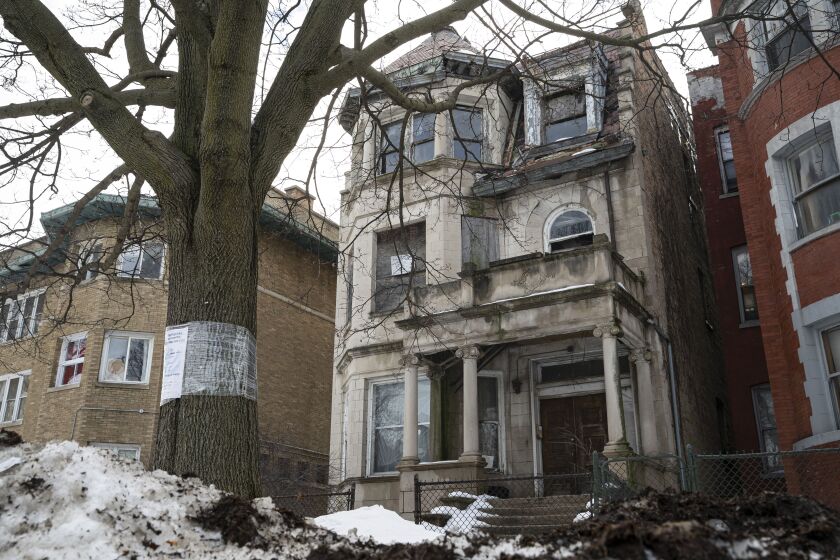Advocates celebrated when after a years-long battle, the Woodlawn childhood home of Emmett Till — the 14-year-old Chicagoan whose lynching lit fire to the Civil Rights Movement — finally gained landmark status, with plans for a museum devoted to Till’s story.
Similarly, supporters cheered Monday when a Bronzeville home that had once been the Phyllis Wheatley Club and Home — a historic settlement house established by Black suffragettes in the early 1900s — got a stay of demolition, plans calling for it to become a women’s history museum.
But those spearheading such efforts to honor Black heritage and culture by preserving the now disappearing or decaying properties significant to that history, have a new obstacle.
An ordinance recently introduced by Ald. Sophia King (4th) before the City Council Zoning Committee would restrict establishment of “house museums” in residential neighborhoods.
The legislation has drawn outrage from the small but passionate community of operators of existing and planned house museums, including those projects honoring Till and Wheatley, and others honoring famed journalist Lu Palmer and blues giant Muddy Waters.
“If one of us is affected, all of us are affected,” said Naomi Davis, founder/CEO of Blacks In Green, which purchased the Till home in October, currently trying to raise the $11 million needed to convert it into The Till-Mobley Great Migration Museum, Garden and Theater.
“We were elated by the Landmarks Commission hearings, by the comments of Department of Planning Commissioner Maurice Cox that support would be flowing to us from municipal quarters, and by the expedited landmarking approval during Black History Month,” she said.
“So it was a shock that the same body that was so supportive would suddenly take a sledgehammer, instead of a scalpel, to deal with common problems of community engagement and parking with this proposal that will have a damning effect on an emerging tourism industry, which has been underfunded, ignored, maligned and then whitewashed.”

Naomi Davis, founder and CEO of Blacks in Green, purchased the childhood home of Emmett Till in October, currently trying to raise the $11 million needed to convert the brick two-flat at 6427 S. St. Lawrence Ave., in West Woodlawn, into The Till-Mobley Great Migration Museum, Garden and Theater.
Provided
Currently, Chicagoans can establish such house museums, galleries and library-type institutions in private homes without city approval.
Under King’s ordinance, primarily residential neighborhoods — those zoned RS1, RS2 and RS3 — would require private owners to obtain a zoning change through their alderman, before undertaking such an endeavor. Outside of those three zones, house museums and other such entities would require special use permits, through the Zoning Board of Appeals.
“I’m all for landmarking and preserving our cultural heritage. What most people don’t know is that in the city of Chicago, you can turn your home into a museum, ‘as of right.’ That means you don’t have to ask for any relief from the city whatsoever. You can do it just because. And that is the impetus for this,” the ordinance’s sponsor told the Sun-Times.
“If indeed you want to open a museum, all I’m saying is that there should be a community process, so that your museum doesn’t adversely impact the quality of life for your neighbors. It would not impact existing museums. They would be grandfathered.”

Ald. Sophia King (4th) introduced an ordinance before the City Council Committee on Zoning, Landmarks and Building Standards that would restrict establishment of “house museums” in residential neighborhoods, drawing outrage from the city’s small but passionate community of operators of existing and planned house museums.
Ashlee Rezin Garcia/Sun-Times
Banding together, the operators have sought the help of Preservation Chicago, which works with stakeholders to protect and revitalize the city’s historic architecture and urban spaces, resulting in a change.org petition that to date has gained over 1,800 signatures. It will be presented to the Zoning Committee — set to take up the ordinance at a March 23 meeting.
“We worked very hard with the community and organizations like Blacks In Green and the city to landmark the Emmett Till and Mamie Till Mobley House, and raise awareness on the Phyllis Wheatley Home. And we have been working with The Obsidian Collection that wants to repurpose the Lu and Jorja Palmer residence,” said Preservation Chicago’s Ward Miller.
“All of these buildings would become house museums in part, celebrating African American history. This is very tragic and alarming, and even quite disturbing. This ordinance jeopardizes all of these amazing cultural institutions of the near future, and will be detrimental to so many of the rich cultural stories and histories these houses help to share.”
Preservation Chicago counts more than 30 entities citywide that would be impacted.

Advocates fighting to save the Phyllis Wheatley Club and Home in Bronzeville, an early 20th century settlement house established by Black suffragettes to aid Black women during the Great Migration, won a victory in Buildings Court Monday. The building, which supporters seek to convert into a women’s history museum, got a stay of demolition.
Anthony Vazquez/Sun-Times
Many of the house museum proposals in recent headlines stem from renewed efforts to acknowledge Black history in all of its trauma and richness, after a year that saw the killing of a Black man, George Floyd, under the knee of a white police officer, and America’s reckoning with race.
“This proposal is extremely shortsighted. What are we supposed to do with these historic properties in Black communities?” asked Obsidian Collection founder Angela Ford, purchasing the Palmer home in Bronzeville for her nonprofit’s Black history digital archives.
“If you’re not allowing these uses, you’re only making room for these properties to be razed by developers to build multilevel condominiums in our beautiful, historic communities.”
As a result of the petition, Zoning Committee Chair and Ald. Tom Tunney has been flooded with emails urging the committee to reject the ordinance.
“We are all just disheartened. I’ve worked very hard to establish the MOJO Museum, and have personally had multiple conversations with the alderman, who never indicated she wanted to move in this direction,” said Chandra Cooper, a great-granddaughter of Muddy Waters leading that project.
Both the Waters and Palmer house museum/gallery projects are in King’s ward.
“We’ve gotten money from the National Trust Foundation. We start work next week. We have already started community programming,” said Cooper. “Now you’re saying we’re not going to be able to have this house museum? My question to everybody in the city of Chicago is, ‘If Muddy Waters can be on a mural downtown, why don’t you want to preserve his house?’ ”






